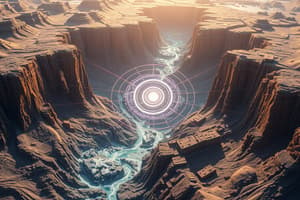Podcast
Questions and Answers
Which statements describe S waves? Check all that apply.
Which statements describe S waves? Check all that apply.
- They are faster than P waves.
- They travel through solids. (correct)
- They move side to side. (correct)
- They arrive after P waves. (correct)
Which phrases describe an earthquake's epicenter? Check all that apply.
Which phrases describe an earthquake's epicenter? Check all that apply.
- Area at Earth's surface (correct)
- The area of maximum damage
- Region directly above the focus (correct)
- The point where the earthquake starts underground
What happens when stress builds at faults? Check all that apply.
What happens when stress builds at faults? Check all that apply.
- Rock can bend and break. (correct)
- Forces affect Earth's rocks. (correct)
- No effects occur.
- Energy may be released. (correct)
Which statements describe the Richter scale? Check all that apply.
Which statements describe the Richter scale? Check all that apply.
Which statements describe surface waves? Check all that apply.
Which statements describe surface waves? Check all that apply.
Which factors are involved in earthquake formation? Check all that apply.
Which factors are involved in earthquake formation? Check all that apply.
Which statements describe a seismograph? Check all that apply.
Which statements describe a seismograph? Check all that apply.
How do geologists use data from seismographs to learn about earthquakes?
How do geologists use data from seismographs to learn about earthquakes?
Which statements describe the Mercalli scale? Check all that apply.
Which statements describe the Mercalli scale? Check all that apply.
How are S waves and P waves similar? Check all that apply.
How are S waves and P waves similar? Check all that apply.
Flashcards are hidden until you start studying
Study Notes
S Waves
- S waves move side to side and travel through solids only.
- They arrive after P waves during an earthquake.
Earthquake Epicenter
- The epicenter is located at the Earth's surface.
- It is the region directly above the earthquake's focus.
Fault Stress
- When stress accumulates at faults, energy may be released.
- Rocks can bend and break due to accumulated forces affecting them.
- These processes influence the behavior of Earth's rocks.
Richter Scale
- The Richter scale measures fault movement during earthquakes.
- It increases in magnitude with the amount of damage caused.
- The scale determines an earthquake's magnitude based on the size of its seismic waves.
Surface Waves
- Surface waves travel slower than P waves.
- They result in significant ground motion.
- These waves are produced by the interaction of P and S waves.
Earthquake Formation Factors
- Earthquakes are caused by moving tectonic plates.
- Rocks can break during stress, contributing to seismic activity.
- Movement occurring below the Earth's surface plays a crucial role in formation.
Seismographs
- Seismographs feature a curved graphing surface and are essential for locating epicenters.
- They utilize a needle on graph paper to measure seismic wave activity.
- Seismographs help determine the arrival times of P waves.
Geologists and Seismographs
- Geologists use global data from seismographs to analyze earthquakes and improve understanding.
Mercalli Scale
- The Mercalli scale evaluates earthquakes based on the damage caused.
- It employs Roman numerals to categorize the level of damage.
Comparison of S and P Waves
- Both S waves and P waves induce ground shaking.
- They travel through solids; P waves can also move through liquids.
- Both types of waves can transform into surface waves.
Studying That Suits You
Use AI to generate personalized quizzes and flashcards to suit your learning preferences.




